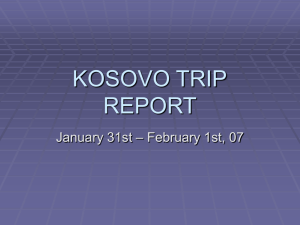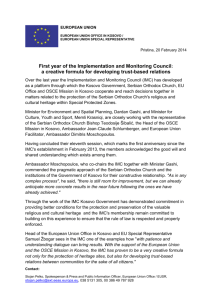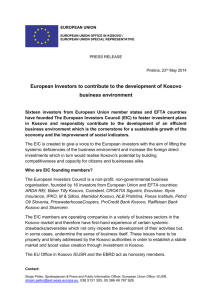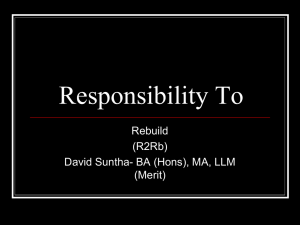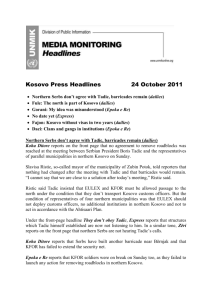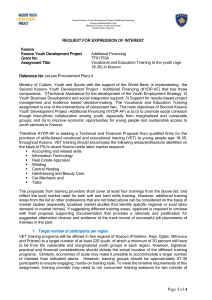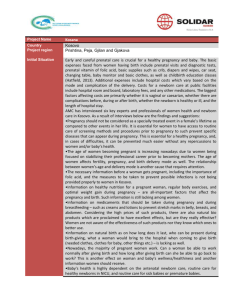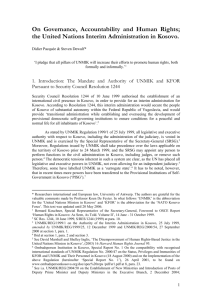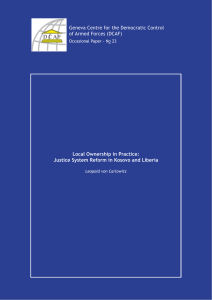Statement by Zahir Tanin, Special Representative Of The Secretary
advertisement
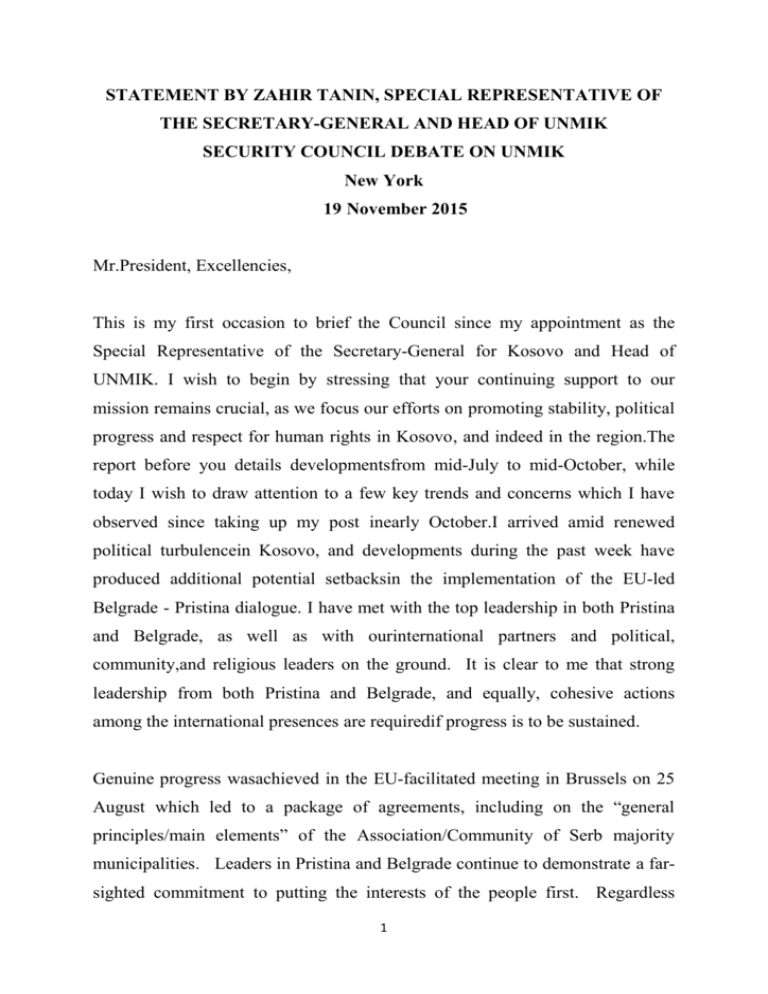
STATEMENT BY ZAHIR TANIN, SPECIAL REPRESENTATIVE OF THE SECRETARY-GENERAL AND HEAD OF UNMIK SECURITY COUNCIL DEBATE ON UNMIK New York 19 November 2015 Mr.President, Excellencies, This is my first occasion to brief the Council since my appointment as the Special Representative of the Secretary-General for Kosovo and Head of UNMIK. I wish to begin by stressing that your continuing support to our mission remains crucial, as we focus our efforts on promoting stability, political progress and respect for human rights in Kosovo, and indeed in the region.The report before you details developmentsfrom mid-July to mid-October, while today I wish to draw attention to a few key trends and concerns which I have observed since taking up my post inearly October.I arrived amid renewed political turbulencein Kosovo, and developments during the past week have produced additional potential setbacksin the implementation of the EU-led Belgrade - Pristina dialogue. I have met with the top leadership in both Pristina and Belgrade, as well as with ourinternational partners and political, community,and religious leaders on the ground. It is clear to me that strong leadership from both Pristina and Belgrade, and equally, cohesive actions among the international presences are requiredif progress is to be sustained. Genuine progress wasachieved in the EU-facilitated meeting in Brussels on 25 August which led to a package of agreements, including on the “general principles/main elements” of the Association/Community of Serb majority municipalities. Leaders in Pristina and Belgrade continue to demonstrate a farsighted commitment to putting the interests of the people first. Regardless 1 ofshorter term political posturing and problems, I perceive on both sides anunderlyingresolve to overcome some of the most difficult issues affecting mutual relations through the dialogue. The gains, however, facecontinuous challenges which affect full and timely implementation of agreements, as demonstrated during the most recent days. Implementation of the terms agreed between the parties on 25 August in Brussels began during this period. On 17 October, work commenced on the revitalisation on the Mitrovica bridge as part of this implementation. On 30 October, Kosovo President AtifeteJahjagahas submitted the agreement for review by the Constitutional Court. The Court has issued a temporary suspension of implementation, pending issuance of its opinionwithin 60 days, raising concerns about the possibility of delays. I join in urging all stakeholders involved to ensure that the commitments agreed to are reviewed in short order, and fulfilled on schedule. For Kosovo, a major step forward was taken on 27 October, when Prime Minister Isa Mustafa and Minister of European Integration and Chief Negotiator BekimÇollaku together with High Representative of the European Union for Foreign Affairs and Security Policy, Federica Mogherini,and Commissioner for European Neighbourhood Policy and Enlargement Negotiations,Johannes Hahn,signed a Stabilisation and Association Agreement. I wish to congratulate the leadership in Pristina on this achievement. The Agreement not only expressesthe commitment of Kosovo toits European path, but equally the European commitment to Kosovo. As importantly, it shouldopen the doors for increased trade and investment, as well as improved prospects for economic growth and employment opportunitiesso much needed in Kosovo, in particular for its young population. The ratification of this agreement in the Assembly of 2 Kosovo demonstrated the ability of the institutions to recognise and capitalise on long-term strategic interests. As I stressed at the outset, however, the current political challenges arealso very serious. On several occasions during this period, violent tactics and disruptive behavior impeded the proceedings of the Assembly of Kosovo, the institutionat the core of the democratic process. Members of the political opposition used tear gas and other objects in the Assembly chamber, including just two days ago when the use of pepper spray and tear gas once again forced the Assembly to relocate its session. Clashes between opposition supporters and Kosovo police also resulted in injuries to police and damage to public and private property. The opposition parties have expressed intent tocontinue trying to blocksessions of the Assembly. I have strongly deplored theseviolent and unacceptable actions. Argument and debate belong in Kosovo’s democratically elected Assembly, force and intimidation do not. I commend the restraint demonstrated by the Kosovo institutions, in the face of serious provocations,and I urge all parties to participate in dialogue and allow a constructive political discourse which is vital to progress in Kosovo. The rule of law must be appliedequally, any persons who resort to violence must be held to account. Mr. President, Political progress, or its absence, directly affects the circumstances and atmosphere on the ground in Kosovo. Despite progress in many areas, there remain signs of deeppublic frustration, along with unfortunate political tendencies to lapse into divisive rhetoric. Our mission and our international partners continue to work with local communities and central authorities to reduce tension whenever it arises. Ultimately, however, the onus is upon 3 political leaders to take responsibilityfor setting a tone which furthers reconciliation and the normalisation of relations. During this period, Kosovo’s application to UNESCOhas weighed heavily in public sentiment and debate. However, I would say that too often public debate and diplomatic struggles have tended to blur the underlying issues. The protection and preservation of culturaland religious heritage should remain the subject of intensive communication between Belgrade and Pristina, including through the Brussels dialogue. We remain closely engaged with all the stakeholders to support consensual and lasting solutions. Reconciliation also requires enhanced effort to determine the fate of persons missing from the conflict, with more than 1,600 persons still unaccounted for. The focus should remain on the needs of the surviving family members waiting for clarity on the fateof their loved ones.I welcome the recent cooperation shown by Belgrade and Pristina in the framework of the Working Group on Missing Persons, chaired by the International Committee of the Red Cross. I would like also to echo the Secretary-General’s message in the report on the importance of continued progress in the process of the establishment of the Specialist Court, as agreed between the European Union and Kosovo. With regard to returns to Kosovo of persons displaced as a result of the conflict and its aftermath, the current trend indicates that the number of returnees in 2015 will be the lowest since the year 2000. No more than 427 individuals have returned as of October, according to UNHCR. I call upon all stakeholders to increase available resources, so that more voluntary returns to and within Kosovo will be encouraged and sustained. The Ministry of Communities and Returns is presently working on essential legislation specifically to protect the 4 rights of displaced persons, and I urge this law to be passed as a matter of priority. Mr. President, Resilience and stability in the region arefurther being tested at present amid the influx of refugees and migrants transiting through the Western Balkans in unprecedented numbers. According to UNHCR, as of 5 November, there have been over 650,000 arrivals in Greece by sea since the beginning of the year, the great majority of them transiting north via the Western Balkans route. Over 210,000 people were recorded in October alone. The influx of such a large number has stretched capacities and resources. While Kosovo has been less directly affected so far, the Kosovo authorities and the international presences are working together to prepare contingencies. UNMIK is monitoring the situation,in close coordination with UNHCR and allpartnersin the region. Mr. President, As we have just witnessed in the tragic events in Paris, the phenomenon of violent extremism is a very current and global concern and theWestern Balkansregion is no exception. This transnational issuedemands close cooperation among regional and international stakeholders, andin this light Kosovo’s recent adoption of a strategy for the prevention of violent extremism and radicalisationis one important element. UNMIK continues to support and facilitate the work of Kosovo’s institutions, within its mandate and in close coordination with its international partners.Above all, these risks demand improved information-sharing and cooperation among all regional actors and their agencies. 5 Mr. President Let me conclude my remarks by expressing my deep appreciation to the membership of thisaugust Council for sustained engagement with Belgrade and Pristina, and for ongoing support of UNMIK. Indeed, thiscommitmentremains essential in order to safeguard the political process. Our Mission will continue to cooperate closely with allinterlocutors and international partners to promotepeace and progress as mandated by this Council. Thank you very much. For more information, please contact: Sarah Crozier Spokesperson and Chief M:+377 (0)44 500 107 T:+381 (0) 38 504 604 (ext) 5475 E:croziers@un.org ----Shpend Bërbatovci Public Information Officer M:+377 (0)44 503 074 T:+381 (0) 38 504 604 (ext) 3989 E:berbatovci@un.org 6
